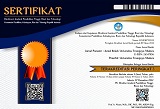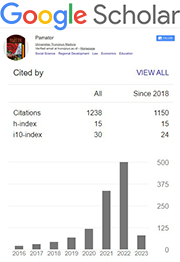Hegemoni Dibalik Hubungan Bilateral Tiongkok-Indonesia
Abstract
China is the largest superpower country in Asia nowadays. With its popularity in the fields of technology, transportation, infrastructure and others has attracted ASEAN countries, including Indonesia, to become more interested in tightening cooperation with China. However, what is almost forgotten is how China takes advantage of this moment to expand its expansion to other countries and it starts from the nearest countries. In this study, the authors used qualitative research methods - descriptive analytic with Library Research data collection techniques. The purpose of this study is to see how hegemony in bilateral relations between Indonesia and China. The results are hegemonic practices exist in bilateral relations between Indonesia and China through the OBOR project and Mandarin Language Center institutions such as Confucius Institute.
Keywords
Full Text:
PDF (Bahasa Indonesia)References
Barker, Chris. (2004). Cultural Studies: Teori & Praktik (Nurhadi,
Penerjemah.). Yogyakarta: Kreasi Wacana.
Mosco, Vincent. (2009). The Political Economy of Communication
(2nd ed.). Los Angeles: Sage Publications.
Storey, John. (2015). Cultural Theory and Popular Culture: An
Introduction (7th ed.). London: Routledge.
Turner, Graeme. (2003). British Cultural Studies, An Introduction
(3rd ed.). London: Routledge.
Ali, Z. Z. (2017). Pemikiran Hegemoni Antonio Gramsci (1891-1937)
Di Italia. Jurnal Yaqzhan: Analisis Filsafat, Agama dan
Kemanusiaan, Vol. 3(2), 63-81. doi: 10.24235/jy.v3i2.5482
Ansori, F. (2017). Pusat Bahasa Mandarin Universitas Al Azhar
Indonesia: Refleksi dan Proyeksi Hubungan Sosial Budaya
China-Indonesia. Jurnal Al-Azhar Indonesia Seri Humaniora, Vol.
(1), 11-16. doi:10.36722/sh.v4i1.246
Harahap, F., & Susiatiningsih, R. H. (2020). Analisis Potensial
Tiongkok Untuk Menjadi Negara Hegemon di Kawasan Asia Timur
Melalui Strategi One Belt One Road. Journal of International
Relations, Vol. 6(2), 164-172. Diambil dari https://ejournal3.
undip.ac.id/index.php/jihi/article/view/26540
Putri, S. Y., & Ma’arif, D. (2019). Kerja Sama Ekonomi-Politik
Indonesia dan Cina pada Implementasi Program Belt and Road
Initiative. Jurnal Kajian Lemhannas RI, Vol. 7(3), 53-66. Diambil
dari http://jurnal.lemhannas.go.id/index.php/jkl/article/view/78
Tao, L. W., Thamrin, S., & Waluyo, S. D. (2020). Kerjasama
Keamanan China-Indonesia Guna Menangkal Ancaman Keamanan
Maritim Kedua Negara. Jurnal Strategi Pertahanan Laut, Vol.
(3), 51-68. Diambil dari http://jurnalprodi.idu.ac.id/index.php
/SPL /article/view/586
Thung, Ju Lan. (2017). Confucius Institute at Universitas Al Azhar,
Jakarta: The Unseen Power of China. Jurnal Wacana, Vol. 18(1),
–182. doi:10.17510/wacana.v18i1.576
Theo, R., & Leung, M. W. (2018). China’s Confucius Institute in
Indonesia: Mobility, frictions and Loca surprises. Journal
Sustainability, Vol. 10(2), 530.
Wijaya, H. (2020). Aktualisasi Kebijakan China One Belt and One
Road Di Indonesia Melalui Pembangunan Kereta Cepat Jakarta-
Bandung. Jurnal Dinamika Global, Vol. 5(1),
-122. doi: https://doi.org/10.36859/jdg.v5i1.160
Khairani, B., Khafivah, D. N., & Susanti, R.W. (2019, Agustus). Politik
Luar Negeri Indonesia Dalam Belt And Road Initiative (Bri)
Republik Rakyat Tiongkok. Prosiding Senaspolhi, Vol. 1(1). 295-
Firdaus, Irwan. (2020, 26 April). 70 Tahun Hubungan Indonesia
Tiongkok. https://mediaindonesia.com/read/detail/307777-70-
tahun-hubungan-indonesia-tiongkok. Diakses pada 9 November
Irfani, Faisal. (2019, 15 Januari). Di Balik Populernya Bahasa
Mandarin di Afrika. https://tirto.id/di-balik-populernya-bahasa-
mandarin-di-afrika-deoV. Diakses pada 9 November 2020.
Wartaekonomi.co.id. (2020, 13 Januari). Hah!! Ketimbang AS, China
Paling Berpengaruh di Indonesia?. https:// www.
wartaekonomi.co.id/read266161/hah-ketimbang-as-china-
paling-berpengaruh-di-indonesia. Diakses pada 9 November
DOI: https://doi.org/10.21107/pamator.v14i1.9004
Refbacks
- There are currently no refbacks.
Copyright (c) 2021 Rissa Amanda

This work is licensed under a Creative Commons Attribution-ShareAlike 4.0 International License.
Jurnal Pamator : Jurnal Ilmiah Universitas Trunojoyo by Universitas Trunojoyo Madura is licensed under a Creative Commons Attribution-ShareAlike 4.0 International License.















.png)